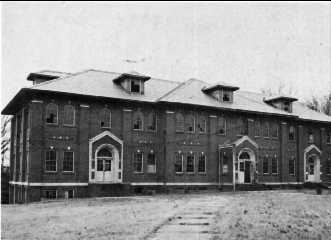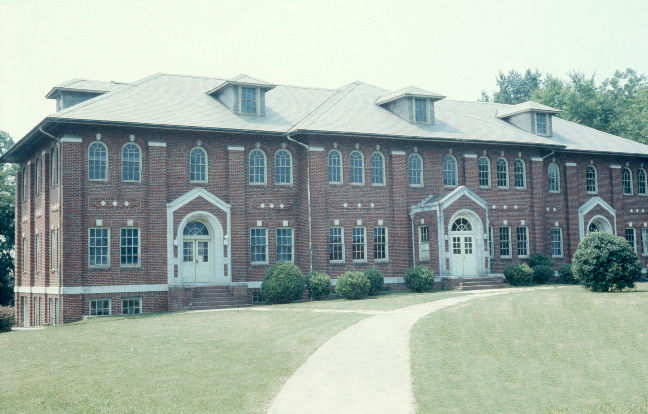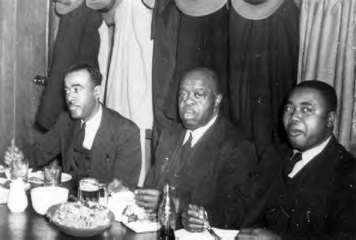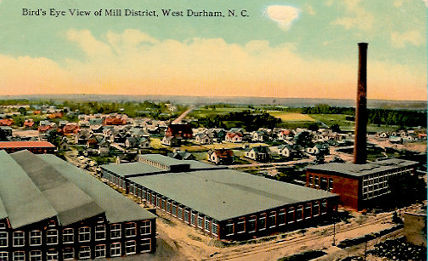Erwin Auditorium, built in 1922. It was a recreation center for Erwin Mills employees. Local builder Joe Berini (whose father came to Durham to work as a stone mason at Duke Chapel) spent his childhood in a house on Hillsborough Road -- near Wallace Electric. In the 1920s, Hillsborough was a dirt road and often muddy. Berini recalls that prior to Durham annexing West Durham in 1925, the neighborhood had running water but no sewage services. As a result, most homes had outhouses in the back yard. He also remembers that Duke's current Central Campus, and along Erwin Road, was a large neighborhood of mill homes. "Erwin Auditorium was the best thing ever done in Durham," Berini said. "Kids came home from school and had a place to go." Finally, Berini recalls people used to fish at the large mill pond on Hillsborough Road (near Carolina Ave). "They were crazy. You'd never know what was in that water." (Photo courtesy of Historic Preservation Society of Durham). Below: Auditorium in August 1975, taken a few years before the EA was razed. The mill was using the facility for storage and additional office space at the time. Photo by Wayne Smith.
Erwin Mills employees (ca. 1940): Three male employees of varying ages sit at table partaking of box lunch, beer, and Coke. They are Aaron Moore, Jackson Bolding, and Henderson Amey. (Source: NC Collection)
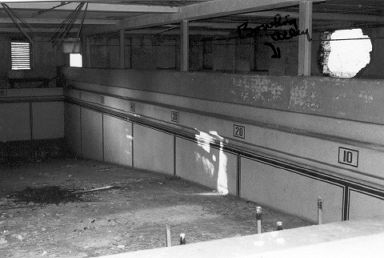
According to long-time resident Faye James Cates, the old West Durham Library was in the entire west side of the Erwin Auditorium. EA also offered large rooms for ping pong, club meetings, theater, and a first floor lounge. The downstairs had a swimming pool, bowling alley, soda fountain (run by Oonie Hawley) and showers. Some men would use the showers for their Saturday night bath.
A favorite place at the EA was the basketball court that was also used as the movie theater. Boys sat on one side while girls sat on the other. The stage was used for the boys to wrestle with one another. EA had tennis courts and a community park outside.
The original EA baseball diamond was at the corner of West Main and Broad (where the Mad Hatter's Bake Shop now stands)

Softball in West Durham: In addition to being manager of Erwin Auditorium, "Cocky" Bennett coached the baseball and softball teams that included players like Billy Cheek, Harold Wilkins, Winston Suitt, Bobby Avery, Leroy Rose, Russell West, Troy Clark, Raymond Barnes, Amos Odom, Malcom Earp and Troy Williamson. (courtesy of Ethel Faye James Cates)
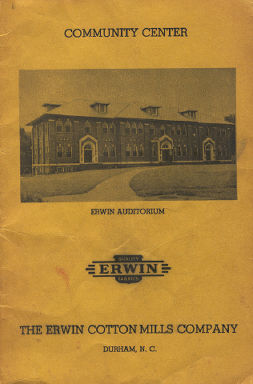
1952 Company booklet with Erwin Auditorium on the cover (courtesy of Wayne Smith).
Aerial view of Mill District.
In the first year of 1923
(poem by C.T. Poe, Jr.)A community center across from Erwin mill
Was opened to the use and enjoyment
Of Erwin workers and families living on the village hill.It was a most elaborate building
One that created envy from places all around
For Mr. W.A. Erwin had made a dream come true
Of providing a center for "his people" -- the best to be found.He called it Erwin Auditorium,
A place to read, play, learn, watch a movie, eat.
For flower and craft shows, pageants, and a Tom Thumb wedding
A central place "his people" could relax, compete and meet.It housed a soda fountain, swimming pool, bowling alleys,
Library, game rooms, showers, kitchen, picture booth and gym.
Places for sewing and cooking classes, scout troops, and instructional meetings,
Facilities for volleyball, basketball, and gymnastics made available through him.There was a baby clinic, and a social worker director.
Even music played by Erwin Mills' own band
Made up of members recruited from the mill
That held dedication and enthusiasm superbly in command.(courtesy of George Lougee, Durham Sun)

West Durham, under the enlightened paternalism of mill
magnate William A. Erwin, was a mill village of
advanced design. Even before 1920, Erwin introduced
lights and plumbing, a day-care center and
playgrounds. In 1922 he built a three-story auditorium
with a bowling alley, library, and classrooms for
instruction in the "domestic sciences." Erwin Mills
also sponsored contests and awarded prizes to those
workers with the best-kept yards, or those who were
best in cooking and canning foods.
-Joe A. Mobley, The Way We Lived in North Carolina
(UNC Press)
"If there was a heaven on earth, it was Mill Hill."
-Chlorese Eubanks, 15th Street

